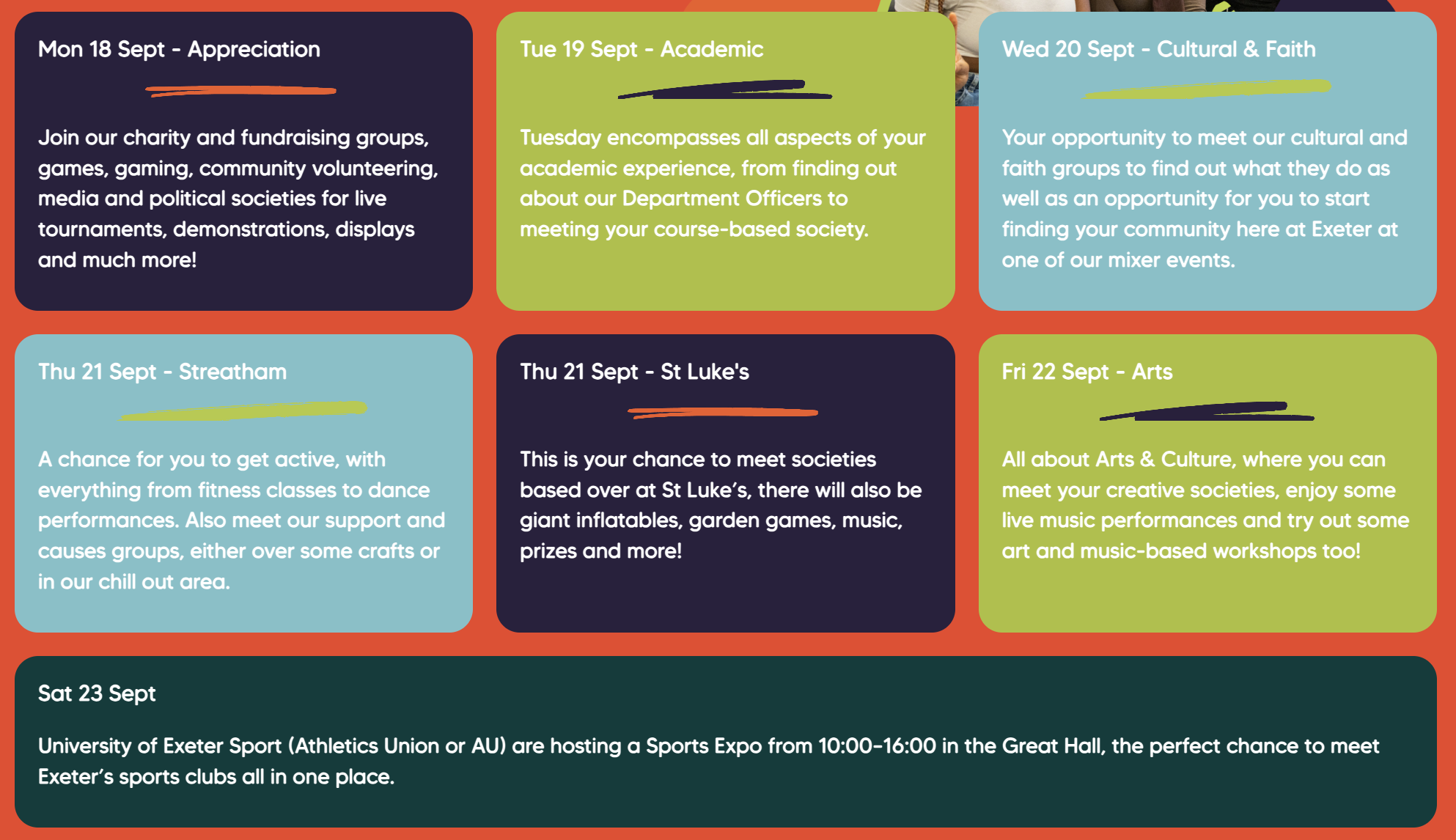By the end of this month, most of the latest cohort of student members will be in place on campuses and in cities across the UK, ready to get their teeth stuck into the day-to-day regime of university life, and eagerly (or perhaps nervously) scanning their inboxes for when their first lecture might be.
For most of us working in SUs, by the end of the month, the opportunity to induct our newest students, or welcome back existing ones, will have been and gone.
In a lot of ways, this is a chance for SUs to show off everything we can do and, ultimately explain to students how we can support and improve their student experience.
The best way to do this is still anyone’s guess and is a debate amongst new officer and staff teams every year. Nevertheless, it is an important conversation to have.
Officers come from a variety of backgrounds and want different things in their freshers’ week – just like our new students. The more we try to learn from those ideas the better.
Back in the ol’ days
Previously, that process would have been almost formulaic – book a large space, get societies and clubs signed up, and get new freshers in through one door and out one at the other end while talking to as many as possible. All the while attempting to quickly show off the value extra-curricular activities can bring.
The freshers’ fair has been a part of the university starter pack for decades – one massive day of promo and an extravaganza of engagement to kick off your university life – and this was the accepted method of drumming up society memberships for the year ahead. In many ways, it’s like a mini university open day for the SU or Guild.
For years, the snake of wide-eyed freshers through some great hall or another was just part and parcel of the university induction schedule. By the end of the row of hundreds of societies, and sports clubs, some with demonstrations, or baked goods to entice their next generation of members.
Rapid fire
There is nothing fundamentally wrong with this method, it got people to sign up, part with their money, come into the SU and that was that.
One of the ways this was done was through club and society committees practising their elevator pitches. There is only a limited window of attention for students to look at a society and decide whether it is for them, particularly if there’s a constant throng of people.
Student leaders need to be fleet of foot to spot a lone fresher, adrift from their herd, and pounce, marking off another tally on their membership figures as they do so.
Alongside this intense induction lies the equally fast-paced socials induction: pub crawls and mad nights of frantic fun are the hallmarks of a freshers’ week experience, so much so that there are often discussions around whether these elements are integral to a successful event (hear Emma, our wonderful President, speak on the issue here). To me, most of that sounds like great fun, but to others, you can see where Freshers has acquired the nickname “hell week”.
This has been the way of the world. Generations of students remember their freshers’ experience (or barely remember their freshers’ experience, which is kind of the point for some) in a fond light and see this as just “part of the experience” of “being thrown in at the deep end”.
But looking back regularly on past practices is useful, and provides what can sometimes be an all-too-needed refresh of welcome weeks. Particularly as your current society committees may have not had a freshers’ week of their own due to lockdowns – making them a perfect opportunity to build in better habits and try new things.
For instance, during our own Guild’s reflection on welcome week, we found gaps in our current provision that students can fall through.
Space jam
Space provision is one of those gaps; when ever-increasing student numbers are a fact of the university system, finding a suitable place to put all of the societies (we had 323 Societies alone at Exeter last year, not including any sports clubs) is a challenge not many locations are equipped to solve adequately.
Add to that the issue around the accessibility of space with over a thousand students talking at the same time, each group trying to out-sell their neighbours and competing for the attention spans of the students in front of them, and you have a real gap of provision for some of the sector’s most consistently marginalised students.
As well as this, with hundreds of competing providers in the same space, you run the risk of missing something that you might want to join, just because you didn’t see it over the crowd, or were too tired to engage with it properly once you did, because it came at the end of that parade of podiums.
Through no fault of their own, societies are being impeded in their abilities to effectively attract students, just because, on the day of the fair, they are one of hundreds of societies, represented by thousands of faces, and with minimal time or space to effectively show people what they’re all about.
Experiment in practice
So what’s the solution? At Exeter, we’ve decided to remodel the process. Gone is the maelstrom of the fair, and in its place, a week of content designed with societies at its heart.
Each day will be for a separate type of society (Academic Societies, Culture and Faith Societies… ) to allow for students to curate their experience how they want to.
Each day will include events across the campuses, to ensure that, just because you can’t get to one location, doesn’t mean you should miss out on the goings on.
Each day will be a showcase of how societies want to engage with the students, using a framework we have provided, but ultimately, how those societies want to use the platforms the Guild put forward is down to those societies and their leaders.
- Mon 18 Sept – Exeter’s Downing Street: This is students’ chance to meet our political and thinktank Societies on campus! Throughout the day there will be opportunities to chat to society committees and interact in various and activities they’ll have available. Alongside societies, there will be arts and crafts stations available when students can collage their own political art!
- Mon 18 Sept – Meet the Game and Gaming Societies: Throughout the day there will be opportunities to play games, get involved in tournaments, and learn about some of opportunities our Game and Gaming Societies host each year.
- Mon 18 Sept – Campus Newsroom with our Media Societies: This is students’ chance to meet Media Societies on campus and try their hand at writing, filming and recording.
- Tue 19 Sept – Academic: Tuesday encompasses all aspects of students’ academic experience, from finding out about Department Officers to meeting course-based societies.
- Wed 20 Sept – Cultural & Faith: This is students’ opportunity to meet cultural and faith groups to find out what they do as well as an opportunity for students to start finding their community here at Exeter at one of our mixer events.
- Thu 21 Sept – Streatham: A chance for students to get active, with everything from fitness classes to dance performances. Also meet support and causes groups, either over some crafts or in the chill out area.
- Fri 22 Sept – Arts: All about Arts & Culture, where students can meet creative societies, enjoy some live music performances and try out some art and music-based workshops too!
As well as all this, there’s stuff we’re staging centrally too. There‘s shopping tours, sessions for parents and carers, information and training events on visas for international students, relaxed picnics and wellbeing walks, intercultural communication training and events hosted by support socs, outdoors socs, a tour of the campus theatre and a Mario Kart tournament.
These all matter because we know that students need “shallower ends” to get into university life, and we know that you only build belonging when students do things with eachother.

Yes, the approach will cause consternation in some corners – the Freshers’ Fair free for all is a staple of university life, and it does have its merits – but for others, and I hope for most students at Exeter, the new approach is more welcoming.
After all, we’re not getting rid of it, but simply offering our student groups a chance to have a better showcase for the groups we seek to help promote and a more successful and accessible experience for all.
Plus it’s not like this is just plucking an idea out of mid-air: we’ve done this before. Just one look at the events list for 2011 shows the same style of spread-out events, with a litany of opportunities and differing engagement styles to prove that this can work – we just need to make sure that this time, it can be the best possible version of the format.
Societies and students need to be at the heart of everything we do at SUs, that much is obvious. So, by listening to student feedback, and feeding that into how we operate as a model going forward, I think we can be on the right track.
The rear view mirror
This doesn’t mean that we’re leaving the past behind: history and tradition are still important to people, as well as the lessons that we learn from those events, so a deal of looking over our shoulder is required.
It means, however, that the point of changing this system is to be focussed on what we can do here, and now, to make sure that we are the best example of how to welcome students to our campuses in 2023.
The approach will be different to many of our previous methods, and the offering will change over time, of that we can be sure, but this is necessary, and, I believe, prescient. Moving forward is critical, and being informed by our student population is even more so. It’s a risk, changing the approach so fully over the course of just one year: but a risk that we should be willing to take because it is supported, by past practices and by pioneering priorities data.
Our offering must evolve to survive. But we need to make sure it is what students want, but more than that, what students need, to be able to flourish at the institutions they will be calling home for several years of their life.
I hope that this is the way forward, as we look to Welcome students in 2023, whether it’s here in Exeter, or wherever you are.



















Very well written Rhys – fascinating hearing about how Exeter’s approach is so different!
Thanks Max! It’s certainly a change from last year, but we’re hopeful that we’re pushing in the right direction. Would be good to compare notes after the dust from Welcome settles!